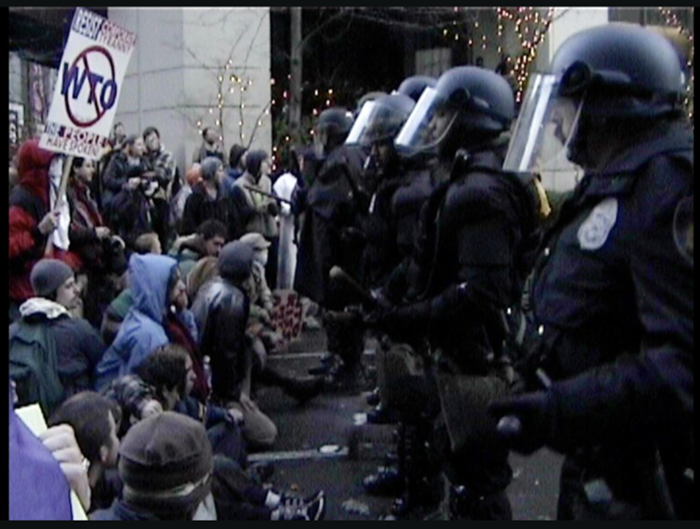This post was originally published on this site
Despite being composed entirely of news/found/archival footage (no talking heads, no voice over), the documentary WTO/99 nevertheless has the aspect of a dream.
It’s hard to believe the event even happened, here in Seattle, in the last days of the 20th century. Who are these people chanting this and that about globalization, exploitation, the rights of workers, and another world that is possible? Who are those officers dressed in Robocop gear? And the horses, the helicopters, the oil tanks rolling down the hill (First Hill?), the smashed windows, the eruption of tear gas, the rising smoke, and the frustrated civil servants from every corner of the world heading toward Belltown. “Aimai-je un rêve?“
And this is what one senses as the meaning of this absorbing documentary by Ian Bell, Alex Megaro, and Laura Tatham. It is seems incredible that so many people flooded the streets of this city with the passionate/irrational/fanatical hope of changing the world—or, better to say, changing the neoliberal world that emerged in the late 1970s, an episode of capitalism that succeeded Keynesianism (post World War 2 state-managed capitalism, social democracy, deep concessions to labor) and the Bretton Woods System (a post World War 2 economic order that permitted capital controls, greater national independence from the world market, strong unions, and big government). By the end of 1980s, it was clear that globalization, privatization, weak worker rights and labor were the only game in town.
But all of a sudden WTO protests erupted in, of all places, Seattle—an remarkable mid-sized city at the corner of the United States. Its mayor, Paul Schell, a standard issue liberal, was as overwhelmed as his city, which experienced its first major appearance on the world trade stage in the manner of curtains and props falling on a homecoming queen. Seattle was not ready for this kind of visibility. And it wanted to retreat into the shadows. To be forgotten. To resume its role as a curious outpost in the corner of the United States.
All of this is in the documentary: the mayhem, the Noah-like embarrassment (drunk and naked), the city’s ambitions seemingly shattered. But this is how the Seattle we now live in was born.
In a few years, Amazon would become a corporate giant and produce another multi-billionaire. In a few years, Seattle would become a tech hub for exactly the global economy that those seen in WTO/99 protested. In a few years, Seattle would become not only a major city but a very expensive one—and the tariffs protestors demand in WTO/99 will be adopted by an authoritarian president (for reasons leading not to American workers but his own wallet—Trump is also, and ominously, in the doc) and make life in Seattle even more expensive. Was it a dream I loved?
Catch WTO/99 at Northwest Film Forum (Seattle, WA) on November 6, or at the Bainbridge Island Film Festival (Bainbridge Island, WA) on November 8 and 9.
